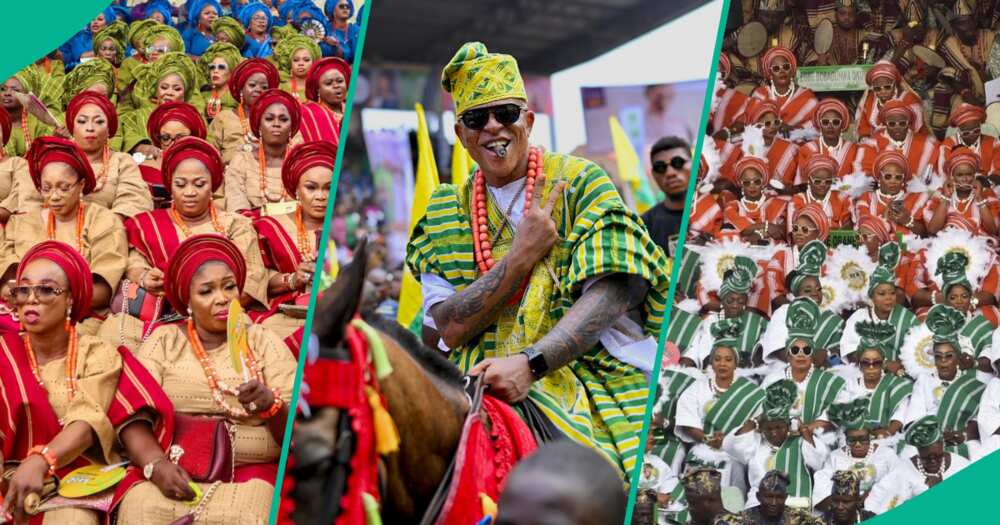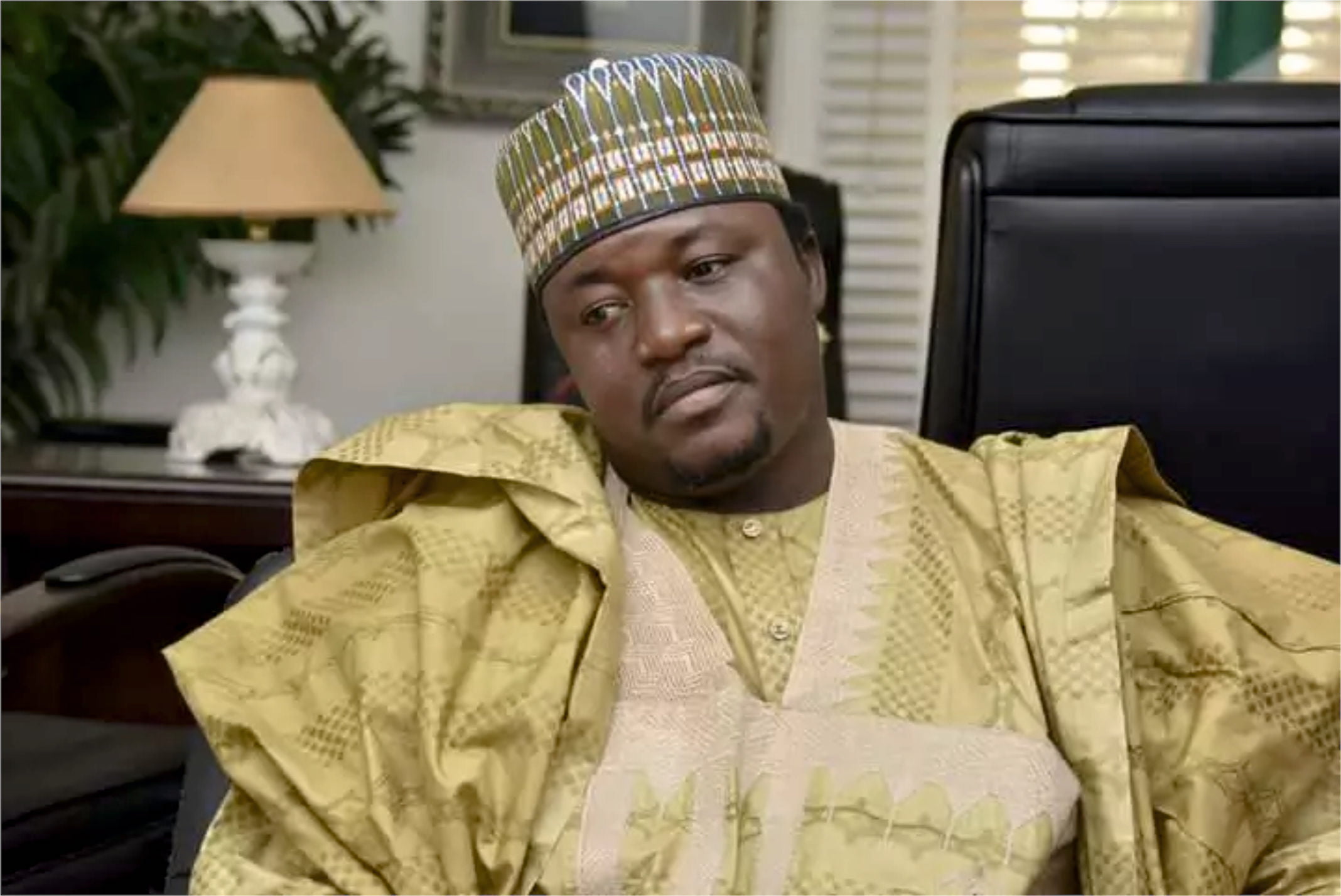The Yoruba people of southwest Nigeria are regarded as one of the most culturally and spiritually vibrant people in Africa and the world.
One of the most prominent exhibitions of their cultural awareness and celebration is the Ojude Oba festival. The celebration is native to the people of Ijebuland and often occurs on the third day of Eid-el-Kabir.
 A breakdown of the historical and cultural significance of the Ojude Oba Festival.
Photo credit: @taoFeek182/@niyifagbemi
A breakdown of the historical and cultural significance of the Ojude Oba Festival.
Photo credit: @taoFeek182/@niyifagbemiSource: Twitter
Ojude-Oba Festival is a one-day celebration of culture, fashion, glamour, candour, beauty and royalty as sons and daughters of Ijebuland, both home and abroad, come out at their best.
The central theme of Ojude Oba is to pay homage to the paramount ruler of the Ijebu Kingdom, the Awujale of Ijebuland, who is currently Oba Sikiru Adetona.
The celebration has been taking place for over a century and has become one of the most revered annual festivals across Yoruba land and Nigeria.
PAY ATTENTION: Share your outstanding story with our editors! Please reach us through info@corp.legit.ng!
Many who don't know the history of the Ijebu festival of glam think it started under Oba Alaiyeluwa Sikiru Adetona, one of the longest-reigning monarchs in Nigeria.
However, according to history, the celebration started as far back as 1886-1887 as a celebration of the growth of Islam in the Ijebuland under the reign of Oba Adesimbo Tunwase.
Short history of how Ojude Oba started
After Christianity and Islam were officially allowed to be practised freely in Ijebuland by Oba Adesimbo Tunwase.
Both religions quickly began to gain converts as mosques and churches were built in many wards in Ijebu-Ode and beyond.
However, monogamy was a significant constraint that made many converts divert from Christianity to Islam.
Balogun Kuku, famed for being the founder of the Ita Oba, now metamorphosed into the Ojude Oba festival, was a traditional worshipper who converted to Christianity and Islam.
To show that he and his family, who were all now Muslims, were doing well economically and in excellent condition, the Balogun Kuku family would go on a parade at the king's frontage on the third day of Eid-el-Kabir.
He was also said to have started the Ita-Oba parade because he couldn't participate in the Odeda festival, which is noted to have been the predecessor of Ojude Oba.
The Odeda festival is an annual event for traditional worshippers such as Sango, Egungun, Osun, Yemule and Ogun.
Highlights and features of Ojude Oba Festival
- Fashion/ Traditional Dressing:
No other festival celebrated across West Africa is big on fashion like Ojude Oba. Different age groups compete for the best dressed, which is why they go for the season's most expensive clothing. Some even pay for exclusive and customised clothes and accessories worn on the festival day.
Attires from previous festivals cannot be worn again at a new Ojude Oba festival. They have to wear entirely different attires every new year, meant to make a statement about the age group's economic status and affluence.
Arguably, no other culture can compete with the cultural fashion, style, and sophistication of the Ijebu flair for glam and glitz at the Ojude Oba festival.
2. Horse-riding:
This is a unique feature of the Ita-Oba festival. Certain clans are regarded as the Balogun families, a continuity of the legacy of Balogun Kuku and the war hero families who converted to Islam and joined him in the annual parade during its early days.
These families are regarded as horse-riding families. These clans pay homage at the king's frontage on horseback with intermittent gunshots used to announce their entry, which sends many people into a frenzy.
3. The Balogun Families
As explained above, the Balogun clans are the elite and forebearers of the Ojude Oba festival and the only ones allowed to ride on horseback when paying homage at the Oba's frontage. Other families and age groups are expected to greet the king in the traditional Yoruba way; the men prostrate while the women go on their knees.
Here's a list of the Balogun families:
Balogun Kuku, Balogun Odunuga, Balogun Agboola Alausa, Balogun Alatishe, Balogun Otubu, Balogun Adesoye, Balogun Odejayi, Balogun Adesoye Onasanya, Balogun Towobola, Balogun Aregbesola and Balogun Ajibike Odedina.
4. Age grade/Club parade (Regberegbe)
Over the years, as the Ojude Oba festival metamorphosed beyond just being an Ijebu Muslim celebration, age grades (Regberegbe) joined in paying homage at the Oba's frontage.
Friends, extended family members, classmates and colleagues from schools joined the celebration and are regarded as age-grade groups.
They would often light up the celebration with various glitz and colours as they competed for the best dressed.
Some prominent Ijebu men who participated in the 2023 Ojude Oba celebration:
Olu Okeowo - Real estate billionaire
Mike Adenuga - Globacom founder, the third richest man in Nigeria
Dr Wasiu Ayinde Marshal (Kwam 1) - Renowned Fuji musician
Oba Otudeko - Business magnate, Chairman of Honeywell Group
Olusegun Adebutu Kessington (Baba Ijebu) - Billionaire business magnate
Dr Sulaiman Adebola Adegunwa - Former chairman of Sterling Bank and founder of Rite Foods.
Source: Legit.ng
















 English (US) ·
English (US) ·